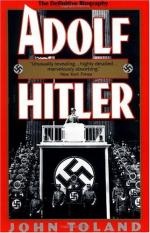|
This section contains 772 words (approx. 3 pages at 300 words per page) |

|
Hitler
Summary: Hitler and The National Socialists Party created a structured and controlled nation, which challenged previous ethics and ideals. The changes in the social and cultural life of Nazi Germany contributed to continuity in Germany because Hitler was able to win the support of the nation by providing work, and therefore created a powerful country. Only his motives were wrong.
The Nazi regime saw the coming to power in 1933 not just as a change of government but rather as the start of a revolution that would change German society. Hitler sought not only to control but also to reshape the state according to Nazi ideology. The Nazis dreamed of a new society, a harmonious, national community free from class division and social conflict.
The transformation of the culture and society in Germany resulted in many new policies, and expectations of the general public. One belief was the need to preserve the purity of the German race.
The Nazi state was obsessed with race. Jews, Slavs, Blacks and many other minority cultural races were forced out of the civil service, universities, schools, the professions and managerial positions. In 1935, German Jews were declared citizens of lesser rights. Thousands left the country. Many who stayed were sent to concentration camps along...
|
This section contains 772 words (approx. 3 pages at 300 words per page) |

|


